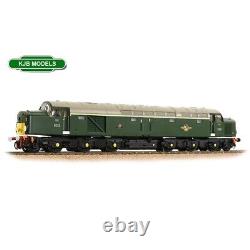OO Gauge Bachmann 32-487 Class 40 Disc Headcode D213'Andania' BR Green Loco



32-487 Class 40 Disc Headcode D213'Andania' BR Green Loco. Brand new model from our new Yorkshire model railway shop. Pristine BR Green (Small Yellow Ends) livery. DCC Ready (It is NOT DCC fitted). Equipped with a Plux22 DCC Decoder Socket - recommended Decoder item No. DETAIL VARIATIONS SPECIFIC TO THIS MODEL. Disc Headcodes (Discs supplied in the Accessory Pack). Stones Boiler Port on Roof (with optional blank supplied in the Accessory Pack). Cantrail Grilles Arranged as appropriate to a locomotive with a Stones Boiler.
Fitted with Multiple Working Equipment. Fitted with Dual Brakes (Air Pipes fitted). Etched Frost Grilles (optional part supplied in the Accessory Pack).
BACHMANN BRANCHLINE CLASS 40 SPECIFICATION. Five pole, twin shaft motor with two flywheels providing drive to both bogies. Authentic 1Co-Co1 drive arrangement with six axle drive. Separate metal bearings fitted to each driven axle. Gearing arranged for prototypical running speeds and haulage capabilities.
16.5mm (OO gauge) wheels to NEM310 & NEM311 standards with authentic profile and detailing. NEM coupling pockets to NEM362 standards integrated into each bogie. Designed to operate on curves of second radius (438mm) or greater. Bogies fitted with separate steps and sandboxes.
Separately applied metal detail parts, including grab handles, sand pipes and etched fan grilles. Pre-fitted driver in one cab. Each model is pre-fitted with a full set of decorated, model-specific buffer beam pipework and accessory parts. Directional lighting, including headlights and high intensity headlights where applicable, switchable on/off at either end on DCC or Analogue control. Cab lighting, assigned to two DCC functions for separate switching of each.Authentic light colours and temperatures selected for each model based on era and application. DCC Ready (NOT DCC fitted).
Two quality speakers employed for optimum sound reproduction, fitted to every model as standard if you wish to add a sound decoder. Authentic liveries applied to all models. Multiple paint applications employed on each model using BR and corporate specification colours. Logos, numerals and text added as appropriate using multi-stage tampo printing using authentic typefaces, logos and colours. In addition, where applicable Etched Nameplates and Plaques are also provided. The British Rail Class 40 is a British Railways diesel-electric locomotive, rated at 2,000 hp and classified as a Type 4. A total of 200 were built by English Electric between 1958 and 1962 and numbered in the series D200-D399. They were for a time the pride of the British Rail early diesel fleet.The final locomotives ended regular service in 1985. Class 40s operated in all areas of British Railways although Western and Southern Region workings were less common.
After the early trials, the majority of Class 40s were based at depots in northern England; notably Longsight, Carlisle Kingmoor, and Wigan Springs Branch on the Midland Region, and Thornaby and Gateshead on the Eastern Region. The heyday of the Class was in the early 1960s when they hauled top-link expresses on the West Coast Main Line and in East Anglia. As additional new rolling stock was introduced, their passenger work decreased, partly due to their lack of electric train heating for newer passenger coaches. This resulted in visits to many distant parts of the network. It would be fair to say that few routes in the London Midland and Eastern regions did not see Class 40-worked passenger services from time to time. Regular destinations included the seaside resorts of Scarborough, Skegness and Cleethorpes on the Eastern region, with Blackpool and Stranraer being regularly visited on the West Coast.
